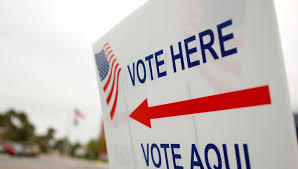Section Branding
Header Content
Carter Center Election Monitor Says Zimbabwe Election A 'Watershed Moment'
Primary Content
Emerson Mnangagwa, 75, was inaugurated Sunday as president of Zimbabwe.
The ceremony took place after nearly a month of post-election turmoil — a failed legal challenge by the opposition party that claimed discrepancies in the voting, and a deadly crackdown on opposition protestors by the military.
Elections monitors from the Atlanta-based Carter Center have been in Zimbabwe to assess whether Zimbabwe's election was legitimate.
Sarah Johnson leads elections monitoring for the Carter Center and joined Rickey Bevington in the studio.
RICKEY BEVINGTON: When I hear the term elections monitor, I envision a stern-faced official standing over a ballot box eyeing people suspiciously as they drop of vote into a box. It's probably a little more complicated. What exactly does it mean to be an elections monitor in a country like Zimbabwe?
SARAH JOHNSON: That's a very interesting way of looking at it. I imagine that many people have that same impression. It's actually a much longer process when we deploy an election observation mission.
We have deployed a team of observers several months in advance of the elections so that they can look at many critical steps of the process that lead up to Election Day. For example… to monitor voter registration and whether or not citizens can register to vote, candidate nominations and whether or not one can present themselves as a candidate in an election, leading all the way through the campaign to election day.
So on Election Day we do go out and visit polling stations and monitor to see the procedures are being implemented correctly.
But Election Day is really just one very small part of that process.
BEVINGTON: And I understand a large part of your work is not doing all the work yourselves, but really supporting local people to monitor their own elections?
JOHNSON: Yes, we have several programs in different countries around the world where we are supporting citizen observation groups and local organizations. They have expressed an interest in learning more about their elections, and increasing the transparency and accountability of an election.
The Carter Center has developed an open source software tool that can be used either with a smartphone or even a dumb phone. So observers will download the app to their phone and submit their observations and submit the results in their polling station.
And that way all that data can be gathered in one place very quickly, and then you can at a national level look to see whether or not the polling station results that are being reported are the same as what is being announced at a national level for different polling stations.
BEVINGTON: And that's a lot of citizens taking ownership in their democracy.
JOHNSON: Exactly.
BEVINGTON: International investment is fundamental to so many countries. Talk about the connection between the work that the Carter Center does to legitimize or monitor elections and the public image that a country gives to the world. Why is that so important?
JOHNSON: This election really was a watershed moment for them to be able to rejoin the international community. Oftentimes other governments will look to an election to see whether what type of relationship it will build with that country.
When a government has been elected in a democratic way and with credible elections then other governments are much more likely to engage with it, both on a foreign relations level but also in terms of foreign investment.
And this is a critical aspect for Zimbabwe, because many of its surrounding governments and many of the potential governments that might engage in Zimbabwe were waiting to see how these elections would go, and really waiting to see if the country would come out of this transition in a stable way and in a way that respects the human rights of its citizens.
BEVINGTON: So is it a legitimate election as far as the Carter Center is concerned?
JOHNSON: Our experts are still on the ground in Zimbabwe to look at the law and how the law was implemented and what reforms could be made.
And there are certainly reforms that could be made to open up greater political space, greater room for a competitive political environment in future elections. Of course, there are clear things that the government can be doing to be respecting the human rights of the citizens.
BEVINGTON: Does the state of Georgia need elections monitoring like the Carter Center does in other countries?
JOHNSON: I would encourage election observation in any country.
I think it's very important to increase the transparency and accountability of an election here in Georgia.
We use outdated voting machines that do not produce a paper slip to show you who you voted for and how your vote is being recorded. The more eyes on the election, the better. It can only help the secretary of state and helps the state of Georgia in increasing the transparency of the elections so that everyone, no matter what party you're from, can have trust that the results of the election are correct and accurate.


